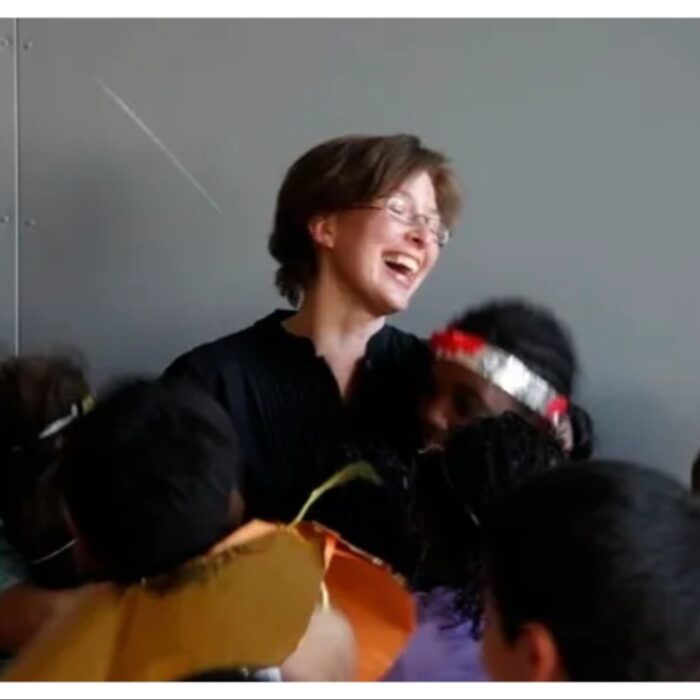
Q & A: Conductor Rebecca Tong & Mezzo-Soprano Tahanee Aluwihare on City Lyric Opera’s ‘La Tragédie de Carmen’
By Chris RuelNew York’s City Lyric Opera recently staged a gritty production of Peter Brook’s adaptation of Bizet’s “Carmen,” “La Tragédie de Carmen.” The opera, an 80-minute chamber piece, retains the musical highlights of Bizet’s original, and brings into sharp focus the tragic stories of the four principal characters: Micaëla, Don José, Carmen, and Escamillo as they collide with one another and ricochet toward a devastating end. CLO took Brook’s adaptation and added a twist pertinent to contemporary life, and opera as an art form.
City Lyric is a young company founded by women. Its mission is to make opera an accessible, relevant experience. As such, CLO’s production of “La Tragédie de Carmen” explored the issues surrounding the prevalence of viewing opera through the male gaze—a vantage point that too often perpetuates archaic and destructive ideas connected with female sexual agency, and the punishment that is meted out for characters, such as Carmen, who express their identities in unabashed ways. City Lyric’s “La Tragédie de Carmen,” was produced, directed, and conducted by female, and female-identifying artists.
OperaWire had the opportunity to connect with Music Director, Rebecca Tong and Tahanee Aluwihare, one of the two mezzo-sopranos singing Carmen in CLO’s revival, regarding the production and the music that combined to make City Lyric’s “La Tragédie de Carmen.”
Music Director, Rebecca Tong
OperaWire: How did become a part of this project?
Rebecca Tong: I knew Katie, one of the co-founders of City Lyric Opera from Chautauqua Music Festival. We worked well together then, and we always talked about working together.
When CLO was searching for a Music Director for “La Tragédie de Carmen,” my name was on the list of candidates. Katie and Megan interviewed me along with a few other people, and I’m very grateful to have been chosen as the Music Director of this production.
OW: What drew you to this adaptation of “Carmen?”
RT: “Carmen” has always been one of the most well-known operas of all time. I relate to City Lyric Opera because I share their vision of redefining opera and making opera accessible to the general public. This adaptation of “Carmen” really works well with CLO’s vision and with the chamber version, we can focus more on the storyline and dramatic characters.
OW: Musically, “La Tragédie de Carmen” is radically reduced from the original Bizet opera. Marius Constant alludes to some of the music that has been cut. Would Constant’s score be in any way recognizable to the newcomer? Some of the standout pieces are still there, are they not?
RT: Oh, definitely! The music chosen for this adaption of “Carmen” has all the highlights from Bizet’s “Carmen” and even when the orchestration is smaller, the adaptation still creates so much drama and intensity in the opera. We can hear Carmen’s “Habanera,” Micaëla’s aria, Escamillo’s “Toreador Song” and Don Jose’s “Flower Aria” at the end. All the crucial highlights are still intact.
OW: You worked with four voices. What were the challenges associated with working with a smaller group of singers, and what were some of the things that happened in this production that simply can’t in the original Bizet version?
RT: With a smaller group, we drew more attention to the storyline and characters. We developed different personalities and created different musical decisions throughout the whole opera. I would not say that things happening in this production cannot happen in the original Bizet version musically per se—but we definitely tried to create a different story from the traditional “Carmen.” That is where musical decisions differ from what we expect of “Carmen” in the past. Also, speaking of staging: We had a pool in the center of the stage, so every ripple effect created from each character means something different and the reflections meant different things for each character and questions us all about humanities.
OW: In addition to the singers, how many musicians did you work within this production?
RT: We worked with 15 orchestral musicians consisting of string quintet, woodwinds quartet, horn, trumpet, trombone, harp, piano, and percussions.
OW: How is it that Constant’s arrangement can hold the story together musically with the reduction of the score?
RT: The original drama and the original music already gives a great foundation of the storyline– but Constant’s adaptation makes it possible to be performed with different mediums and different theatre sizes since it is a chamber version. There are more potentials for the opera to be more accessible to different genres and different groups of people in our society.
OW: What would you say to those who believe great works shouldn’t be tinkered with to the extent of “La Tragédie de Carmen?”
RT: I used to think that way when I was much younger but the more you immerse yourself in this music world, the more you realize, music is to serve a much greater purpose. If we cannot share it to the general public as much as we can, then we are constricting ourselves to only a few select groups, and that’s not what our purpose as musicians should be.
What makes this adaptation work so well is the fact that it can be shared and is more consumable to the general public. Bizet’s “Carmen” will always be the original version but we also know that accomplishing such a production requires many resources. I wish there were more chamber works of various operas available so we can provide access to different societies of what opera is and what opera should be in the future.
OW: The intent of City Lyric’s production of “La Tragédie de Carmen” was to shift the focus away from the traditional male gaze and tell the story from a different perspective. How does the music assist in achieving such a goal?
RT: The notes on the page will not assist in achieving such a goal but how we as musicians and I as music director take different decision makings in our musical process will create our own storyline. City Lyric Opera is an upcoming opera company that takes their vision and mission seriously into bringing something different to the table. With “Carmen,” the notion of a “naughty” female that deserves her fate is, of course, an understatement. The story has been told many times with similar structure.
Under the direction of Victoria Collado and I as music director, we both complement each other in how the dramatic music and each character has to be different from the old notion of “Carmen.” Micaëla is no longer this innocent, helpless girl; Carmen is no longer the slutty deserving fate girl; Don José is no longer the male victim of love; and Escamillo is no longer the heroic feature of the society. We see a different side of each character, how, when and why their actions create different outcomes to others.
We understand the very essence of humanity in ourselves when we see and experience City Lyric Opera’s “La Tragédie de Carmen.” With these different sides of each character’s story, the music becomes very different, and I take different decisions in supporting this production. What is on the page no longer traditional but instead taking it into consideration the drama and the story happening on stage.
OW: What was it like working with a group of artists dedicated to shifting the focus of Brook’s adaptation in the era of #MeToo?
RT: From the very beginning of our rehearsal process, we made it very clear that we wanted to be as equal as possible. Even with the awesome all-female production team, we know that we are not one-sided. It is not all about female power or male power. It is about equality and in this #MeToo movement, we see not only women but also men as victims and vice versa.
Personally, this opera brings out different sides of humanities in people’s personality and how different actions create different outcomes. We are the future generations of operagoers and opera performers, and we are ready to take it further and more progressive than the old days. City Lyric Opera is an opera company that serves the purpose of quality and creativity, and I experienced it myself with this production. Working with the team was a very wonderful and uplifting experience. No one was above anyone, and everyone came together ready to work and make everything as well-prepared as possible. Everyone felt comfortable with each other yet every day we saw how hard people worked as a team. I could not be more grateful to have collaborated with such a wonderful team.
Mezzo-soprano Tahanee Aluwihare
OW: You made your opera debut at the age of 17 with the Symphony Orchestra of Sri Lanka. Did you come from a musical family?
TA: Musical, not particularly, but definitely artistic. I grew up surrounded by all types of art. Everyone in my family has engaged in the visual or written arts at some point – painting, sculpture, graphic design, writing fiction – and I was the only one who basically missed those genes, but it turned out that I just had a musical one! My family was very supportive of me pursuing music, especially once I decided to tackle it as a career. They are traveling all the way from Sri Lanka to see me sing Carmen!
OW: What drew you to take on the role of Carmen in this adapted version?
TA: I have always been drawn to Carmen – in fact, I sang the “Habanera” for my first audition for an orchestral concert. In retrospect, it was likely ill-advised, and I probably should have picked something a little less psychologically and vocally challenging! A specific draw for my working with this company was the all-female production team. It’s not often that you get to tell Carmen’s story through an entirely female gaze.
OW: What was the ratio of dialogue to singing in the adaptation? Bizet interspersed dialogue in his version quite a lot.
TA: Brook’s version doesn’t give the central characters much dialogue at all. Carmen herself only has a few lines. However, it is still a challenge to switch from singing to speaking, and then back again to singing, mostly because Brook chose the moment that we meet Carmen’s husband to initiate a break in the singing. This has the effect of making the confrontation suddenly very raw and realistic, as everything around Carmen slowly begins to unravel.
OW: New York audiences were introduced to “La Tragédie de Carmen” in 1983, and, at the time, the character of Carmen was described by The New York Times as a “…fearless, gritty proto-feminist…” Would you say that description remains valid 36 years later? Is that how you see her?
TA: It’s definitely a valid interpretation, but I would hesitate to call her fearless. She approaches situations as she sees fit always being true to her convictions despite the consequences, but she definitely has fears. This is particularly obvious in her final confrontation with Jose. She is aware that death is near, and definitely fears how and when it will come. How can she not, when fear is part of the human condition? The difference is that she stays true to her instincts despite this.
I would also assert that she is a true feminist in the post-modern sense. Her disdain for societal restrictions while understanding the repercussions is what puts her on par with any 21st-century feminist. She seeks to live life fully despite the consequences for women, both then and now.
OW: You’re familiar with the traditional role of Carmen, having covered the part in 2017 with Opera Noord-Holland-Noord. Did you approach the character differently in Brook’s adaptation?
TA: Brook’s adaptation is definitely grittier and more centered around the interpersonal relationships, exploring domestic violence and power dynamics. By removing the smugglers, dancers, cigarette girls and other similar flourishes that we see in the Bizet original, Brook has managed to make the story darker and the ending all the more tragic. It feels very real, and as relevant in the 21st century as the 19th.
OW: Directors will want different things from characters based on their artistic vision for a particular production, but do you think you’ll carry some aspects of Carmen’s character from Brook’s version into future renditions of the role? What might those be?
TA: We were really been able to strip away all extraneous material to get at Carmen’s raw essence in this version. I really have to credit our director, Victoria Collado about being relentless in working with us on finding the true heart of our characters. She is constantly searching for authenticity, and this has really pushed us as actors, and observers of human nature. It’s this painstaking work that I will definitely take with me as I prepare to perform the role in the future.
The set is also a challenge to work with (it’s not every day you get to work in water as an opera singer!), and it definitely pushed everyone to be scrupulous with their movements. Finding discipline in both characterization and movement is something you can apply to any role.
OW: Over the years there have been many great Carmens. Is there a particular singer you look toward as an influence?
TA: My outright favorite would have to be Agnes Baltsa. Everyone has their own idea of how the role should be sung and who did it best, but Baltsa’s interpretation is fearless both dramatically and vocally. Grace Bumbry’s Carmen is a close second for sheer vocal beauty.


